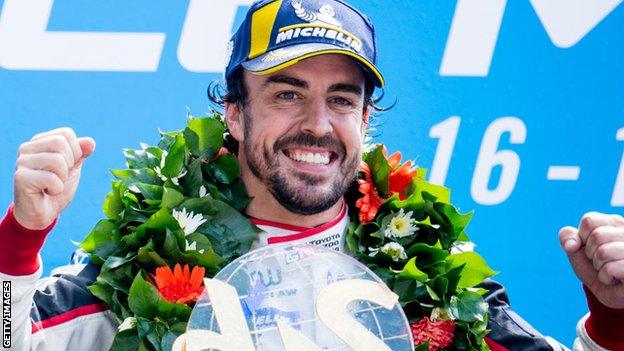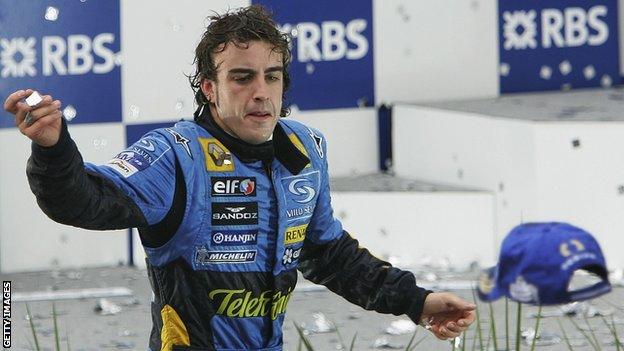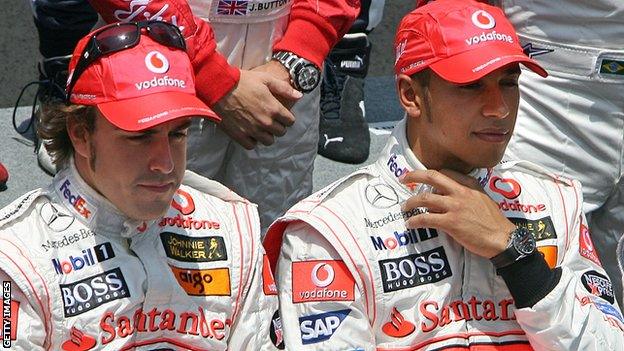'Fernando Alonso is an unbelievable talent - F1 will be a poorer place without him'
- Published
- comments

Fernando Alonso says he will "go on exploring new adventures", having won the Le Mans 24 Hours sportscar race this year
How to feel about Fernando Alonso's decision to retire from Formula 1 at the end of the year?
Sadness, of course, that one of the greatest racing drivers ever to grace the earth will no longer be racing at the highest level of the sport - and that his indomitable, fascinating character will be gone, and with it the most interesting news conferences in the paddock.
But also, in a way, relief. Because watching this unbelievable talent - still, arguably, the best out there - putting everything on the line in the hope that he might qualify his McLaren in the top 10 and scrape a points finish has been a special kind of pain for everyone who recognises his place in the sporting pantheon.
That pain must have been felt by Alonso himself. He has tried to deny it in recent times - but he alluded to it in his retirement statement on Tuesday. "I have some other, bigger challenges than those you can offer me," he said in a video letter to F1 he published on Twitter.
It's hard not to read that as a reference to his current situation, when one of the two greatest drivers on the grid is apparently of no interest to a team that can give him a car in which he could win the third world drivers' championship he has craved for so long.
Why is Fernando Alonso retiring from F1?
How good is Alonso?
The Spaniard, 37, has not won a race for more than five years, and yet he is still sixth in the all-time list of race-winners with 32 victories, still the driver who arguably gets more out of his car more often than anyone else, and has better statistics against his team-mates than any of his rivals, external.
Judging the ultimate talent of F1 drivers is always difficult. For one thing, their only direct comparison is their team-mate, and even then the nature of one car might suit one driver more than another and skew the picture.
All great drivers have their strengths and weaknesses, but Alonso is unique in his level of adaptability - of being able to change his driving style to get the most out of any car he is given to drive. In this, he leaves even current world champion Lewis Hamilton behind.
How to judge his talent? Let's let a few of his colleagues do it.
First, Felipe Massa, his team-mate for four of his five years at Ferrari, who has also partnered seven-time world champion Michael Schumacher.
The German won, give or take, three times as many races and titles as Alonso, and yet Massa thinks Alonso was better "because although Michael was at the top, and an amazing driver, I had an easier time with him - I suffered more with Fernando than I did with Michael."
Of Alonso, Massa says: "First of all, he is an amazing driver. His talent is very complete. He is one of the quickest drivers, but also one of the most consistent, most aggressive. He has everything.
"He is able to use the car in the best way, so he is very intelligent. He is able to understand the race pretty well, everything that is happening. He knows how to use his best in a particular moment."
Rob Smedley, an engineer at Ferrari during the years of both Schumacher and Alonso, describes the Spaniard as "the very best driver of his generation".
Pedro de la Rosa raced in 107 grands prix. He was test driver at McLaren when Alonso was teamed with Lewis Hamilton in 2007, worked with him at Ferrari, also as a test driver. He has raced against Schumacher, and watched Ayrton Senna.
For De La Rosa, Alonso is: "The best driver I have ever seen in my life."
Better than Hamilton? "It is very close between them," De La Rosa says, "but Fernando is more complete."
Hamilton himself said: "You are going to be very hard put to find someone to beat him on raw talent."
And Paddy Lowe, the Williams technical chief who worked with Hamilton and Alonso at McLaren in 2007, says: "He has more spare capacity while driving than anyone I have ever worked with.
"He's a leader. He's the only driver I've ever met who came into the team and said he was going to call a meeting with the engineers. And he did it. He called a meeting with 15 engineers and chaired it. I've never seen that before. He has people batting for him because he organises it."
Two titles versus seven
Some people will read the above and wonder how a driver with 'only' two titles - won in 2005 and 2006 with Renault - can be compared as an equal to contemporaries with four (Hamilton and Sebastian Vettel) or seven (Schumacher).
But that's because an F1 driver's performance is defined largely by his car. Even the greatest drivers cannot win in an average car, as Alonso is proving this year.
Where Alonso differs from these other statistical titans is what he has achieved despite his cars. Hamilton had 21 wins before joining Mercedes but now has 67 after having the best car since 2014. Schumacher had the best car for five consecutive years with Ferrari.

Alonso drove for Renault from 2003 to 2006 and 2008 to 2009
Alonso, arguably, has had the best car only for one or two years in his entire career, when he won his two titles for Renault. And perhaps not even then - in 2005, the McLaren was faster but more fragile, and in 2006 Schumacher's Ferrari, which Alonso defeated, was perhaps better.
Statistically, those two years will define Alonso's career, but in many ways a more illuminating data point is that he is 10 points away from being a five-time world champion - had he scored two more points in 2007, and four in 2010 and 2012. That would be a more fitting reflection of his standing in the sport.
Despite his two titles, Alonso's time at Ferrari will provide the pervading memory, the way he dragged so much more out of uncompetitive cars than they deserved and, in 2010 and 2012, came agonisingly close to the title in cars that were not the quickest.
In 2010, he missed out only because of a massively misguided strategy call by Ferrari at the final race of the season in Abu Dhabi.
That year, the Ferrari was on average 0.7secs a lap slower than the Red Bull in qualifying - although only 0.3secs off in the second half of the year, when Alonso put behind him some mistakes in the first half of the year and closed a 47-point gap with driving of a consistent excellence no-one else could achieve.
But his finest year was undoubtedly 2012, when the Ferrari was only the fourth fastest car but he somehow contrived to win three races and lead the championship for much of the season.
Only a late-season burst by Vettel after a decisive development on the Red Bull, and Alonso's awful luck in being involved in first-corner accidents in Belgium and Japan for which he was in no way to blame, cost him the title.
Stefano Domenicali, Ferrari's then team boss, says: "To achieve that situation with the level of performance we had on that car was remarkable."
It was one of the greatest seasons any driver has ever produced in the history of F1.
The downhill years
Alonso's relationship with Ferrari went south after that, as the frustrations of fighting against ever-bigger odds grew too much.
In hindsight, it's hard not to see his move to McLaren-Honda for 2015 as an emotional one - something, anything, had to be better than this.
He can't say he wasn't warned. Many did. I remember taking him aside at Silverstone in 2014, saying I knew he was thinking about a move, and telling him of internal ructions that were going on at McLaren, and pointing out what a big risk many thought he would be taking. "Maybe," he said.
Perhaps his mind was already made up then. Ferrari had been trying to get him to sign a longer contract, but he'd been asking for a release for some time. They eventually gave it to him, and he signed it, and they quickly signed Vettel to replace him.
Why did he do that? One day, perhaps, the truth will come out.
To this day, there are those inside and outside Ferrari who believe both would have been better off had they stayed together. Perhaps Alonso would have won the title last year had he been in a red car. Perhaps he would be in a better position than Vettel this year. And perhaps then he would not be retiring.
Why is he not in a better car?
How he got into this position is a longer story than we have time for here. Suffice it to say that he can hardly go back to Ferrari, having left there in 2014 after five years of brilliant driving in underperforming cars, having concluded they could never build a competitive machine.
Mercedes is a closed door because the boss of Daimler, Dieter Zetsche, will not have him back after the titanic ructions of his time with McLaren-Mercedes in 2007.
To say that year defined Alonso's career would be over-simplistic. He was at McLaren for only a year first time around. But the seismic nature of events has certainly coloured opinions of him ever since.

Alonso endured a difficult relationship with Lewis Hamilton when the pair drove for McLaren in 2007
In short, Alonso fell out with McLaren team boss Ron Dennis, who reneged on a promise to give him priority status in the team over then-novice Lewis Hamilton. In the vortex of distrust that followed, a cataclysmic weekend at the Hungarian Grand Prix, in which Hamilton also shares some blame, proved the effective end of the line.
In one massive row with Dennis, Alonso threatened to reveal incriminating emails to governing body the FIA in the ongoing 'spy-gate' case in which McLaren were accused of illegally possessing Ferrari technical information and stormed off. He sent his manager back to apologise and withdraw the threat, but it was too late. Dennis had phoned FIA president Max Mosley, and told him of the emails.
The resulting hearing cost McLaren $100m, external when they were fined by the FIA. Mercedes, as 40% shareholder, had to pay $40m.
The other controversy for which Alonso will always be remembered was 'crash-gate', external in 2008, when his Renault team were found guilty of orchestrating a crash by his team-mate Nelson Piquet to help Alonso win the Singapore Grand Prix.
Alonso was cleared by the FIA of any involvement, but many in F1 believe he must have known.
Did he? One source who was involved has told this writer Alonso absolutely did not know. And Mosley told me a couple of years ago that he had used an experienced former detective chief superintendent from Scotland Yard and a very experienced barrister to question Alonso.
"They both formed the view that Alonso didn't know," Mosley said. "You know, from his body language and everything else.
"Everyone else says: 'He must have known; of course he knew.' But I have always relied on my policeman and my barrister because people like that are usually pretty good at telling who's lying and who's not. If I had to stake my life on it, I'd say he didn't know. But I wouldn't feel very comfortable."
The golden memories
No picture of Alonso can be complete without the above controversies, but ultimately it is his driving that has given him the global iconic status he now enjoys.
This was in evidence when he competed at the Indianapolis 500 last year, and two million people tuned into a YouTube feed just to watch him do his first test. In the race, after leading 27 of the 200 laps, he retired with an engine failure and received a standing ovation. Perhaps Indycar is where he will race next year, as he seeks to complete motorsport's unofficial 'triple crown' of Monaco Grand Prix, Le Mans 24 Hours and the Indy 500.
His great F1 drives stand comparison with any from any era.
He picks Valencia 2012 as his greatest, when he came from 11th on the grid to win and produced some stunning overtaking moves on the way.
But how about Imola 2005, when he held off a faster Schumacher for the closing laps in a display of brilliant defensive driving?
Or Singapore 2010, when he pressured Vettel into a mistake in qualifying, grabbed pole, and fended off the German's faster car the whole way?
Or Japan 2008, when he took control of Renault's strategy from the cockpit and asked them to short-fuel him at his first stop, and set a stint of qualifying laps to take control of the race?
Or Italy 2007, a race after the Hungary explosion, when he trounced Hamilton despite McLaren turning against him?
Or Malaysia 2012, when he won in the wet in a car that had not qualified in the top 10 in the previous race in Australia?
The list goes on.
Equally, had he made better decisions, there would be no need to explain why he was so good - the numbers would do it for you.
A senior Red Bull man was chatting in Canada this year and said how silly Alonso had been to turn down their offer of joining them at the end of 2007: "He'd have been a seven-time champion now - he'd have won all Vettel's titles, and 2009 as well."
That was at a party to celebrate Alonso's 300th race and, in hindsight, it was the time I should have realised this decision was coming.
They were giving out caps, and I asked Alonso to sign two - one for my daughter and one for my son.
"A few more races yet, Fernando," I said.
"What is it?" he replied. "Thirteen or 14?"
"I make it 34," I said, referring to 2019.
A smile. A shrug. "Mmm," he said. "We'll see."
Later that afternoon, I asked him how he reflected on the fact that many felt he did not have the success his talent deserved.
"Well," he said, "in a way it is better this way. I would not be happy if I had so many trophies at home and people thought I didn't deserve them."
When he leaves, perhaps Alonso will ponder how he got to this position. Perhaps also, though, there is something for F1 as a sport to consider.
As Lowe told me on Tuesday: "It is an absolute disgrace that F1 cannot give an ace such as Fernando a competitive car. He is one of the all-time greats of F1. And because he can't get into one of the only six cars that can ever win a race in the current business model, then he must leave. This is a sign if we ever needed one that F1 is completely broken."
A couple of years ago, Hamilton wrote in a BBC Sport column that it would be a "tragedy" if Alonso did not win a third title.
It might not be a tragedy in the proper sense of the word but that outcome has now come to pass. Alonso leaves still at the height of his powers, and next year F1 will be a poorer place without him.